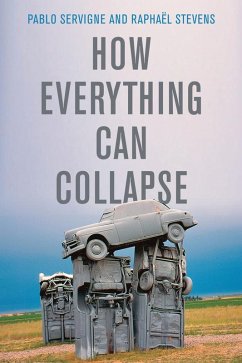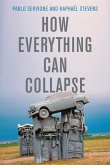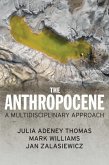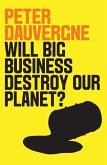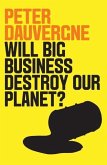What if our civilization were to collapse? Not many centuries into the future, but in our own lifetimes? Most people recognize that we face huge challenges today, from climate change and its potentially catastrophic consequences to a plethora of socio-political problems, but we find it hard to face up to the very real possibility that these crises could produce a collapse of our entire civilization. Yet we now have a great deal of evidence to suggest that we are up against growing systemic instabilities that pose a serious threat to the capacity of human populations to maintain themselves in a sustainable environment.
In this important book, Pablo Servigne and Raphaël Stevens confront these issues head-on. They examine the scientific evidence and show how its findings, often presented in a detached and abstract way, are connected to people's ordinary experiences - joining the dots, as it were, between the Anthropocene and our everyday lives. In so doing they provide a valuable guide that will help everyone make sense of the new and potentially catastrophic situation in which we now find ourselves. Today, utopia has changed sides: it is the utopians who believe that everything can continue as before, while realists put their energy into making a transition and building local resilience. Collapse is the horizon of our generation. But collapse is not the end - it's the beginning of our future. We will reinvent new ways of living in the world and being attentive to ourselves, to other human beings and to all our fellow creatures.
Hinweis: Dieser Artikel kann nur an eine deutsche Lieferadresse ausgeliefert werden.
In this important book, Pablo Servigne and Raphaël Stevens confront these issues head-on. They examine the scientific evidence and show how its findings, often presented in a detached and abstract way, are connected to people's ordinary experiences - joining the dots, as it were, between the Anthropocene and our everyday lives. In so doing they provide a valuable guide that will help everyone make sense of the new and potentially catastrophic situation in which we now find ourselves. Today, utopia has changed sides: it is the utopians who believe that everything can continue as before, while realists put their energy into making a transition and building local resilience. Collapse is the horizon of our generation. But collapse is not the end - it's the beginning of our future. We will reinvent new ways of living in the world and being attentive to ourselves, to other human beings and to all our fellow creatures.
Hinweis: Dieser Artikel kann nur an eine deutsche Lieferadresse ausgeliefert werden.
"An explosive book that everyone should buy and read as soon as possible."
L'Obs
"This is not the kind of book you can read and put down with a shrug of the shoulders: it is a book that will overwhelm you."
Canard Enchainé
"This is an important book. The authors avoid apocalyptic scaremongering but present compelling arguments to show that our society is increasingly vulnerable to insidious but potentially devastating setbacks - and that, because our world is now so interconnected, any collapse would cascade globally. It will leave readers deeply anxious about where we are heading. But it deserves a wide readership among all concerned citizens - and, even more, among those who can influence policy."
Martin Rees, Astronomer Royal and former Master of Trinity College, Cambridge
"It's high time and a cause for rejoicing that this matter-of-fact, warm-blooded guide to societal collapse is now available in English. The sane, comprehensive clarity brought by Pablo Servigne and Raphaël Stevens will, I expect, liberate much practical ingenuity in the US and other countries. Four decades developing the Work That Reconnects and Deep Ecology Work around the world has taught me that confronting together our fears and losses with open eyes generates solidarity and collective intelligence."
Joanna Macy, co-author of Coming Back to Life: The Updated Guide to The Work That Reconnects
"If this crisis has taken most of us by surprise, French researchers Pablo Servigne and Raphael Stevens...can claim to have seen it, or something like it, coming. In their book, How Everything Can Collapse, they suggest civilisation is now vulnerable to a complete breakdown, and that the interconnectedness of modern societies makes that prospect more, not less, likely... today's pandemic and its economic fallout confirm the authors' arguments."
The Australian
"There's a tragic irony that this momentous book, which must have been written well before the coronavirus struck, is published precisely at this time."
Morning Star
"Prophetic"
Bookforum
L'Obs
"This is not the kind of book you can read and put down with a shrug of the shoulders: it is a book that will overwhelm you."
Canard Enchainé
"This is an important book. The authors avoid apocalyptic scaremongering but present compelling arguments to show that our society is increasingly vulnerable to insidious but potentially devastating setbacks - and that, because our world is now so interconnected, any collapse would cascade globally. It will leave readers deeply anxious about where we are heading. But it deserves a wide readership among all concerned citizens - and, even more, among those who can influence policy."
Martin Rees, Astronomer Royal and former Master of Trinity College, Cambridge
"It's high time and a cause for rejoicing that this matter-of-fact, warm-blooded guide to societal collapse is now available in English. The sane, comprehensive clarity brought by Pablo Servigne and Raphaël Stevens will, I expect, liberate much practical ingenuity in the US and other countries. Four decades developing the Work That Reconnects and Deep Ecology Work around the world has taught me that confronting together our fears and losses with open eyes generates solidarity and collective intelligence."
Joanna Macy, co-author of Coming Back to Life: The Updated Guide to The Work That Reconnects
"If this crisis has taken most of us by surprise, French researchers Pablo Servigne and Raphael Stevens...can claim to have seen it, or something like it, coming. In their book, How Everything Can Collapse, they suggest civilisation is now vulnerable to a complete breakdown, and that the interconnectedness of modern societies makes that prospect more, not less, likely... today's pandemic and its economic fallout confirm the authors' arguments."
The Australian
"There's a tragic irony that this momentous book, which must have been written well before the coronavirus struck, is published precisely at this time."
Morning Star
"Prophetic"
Bookforum

